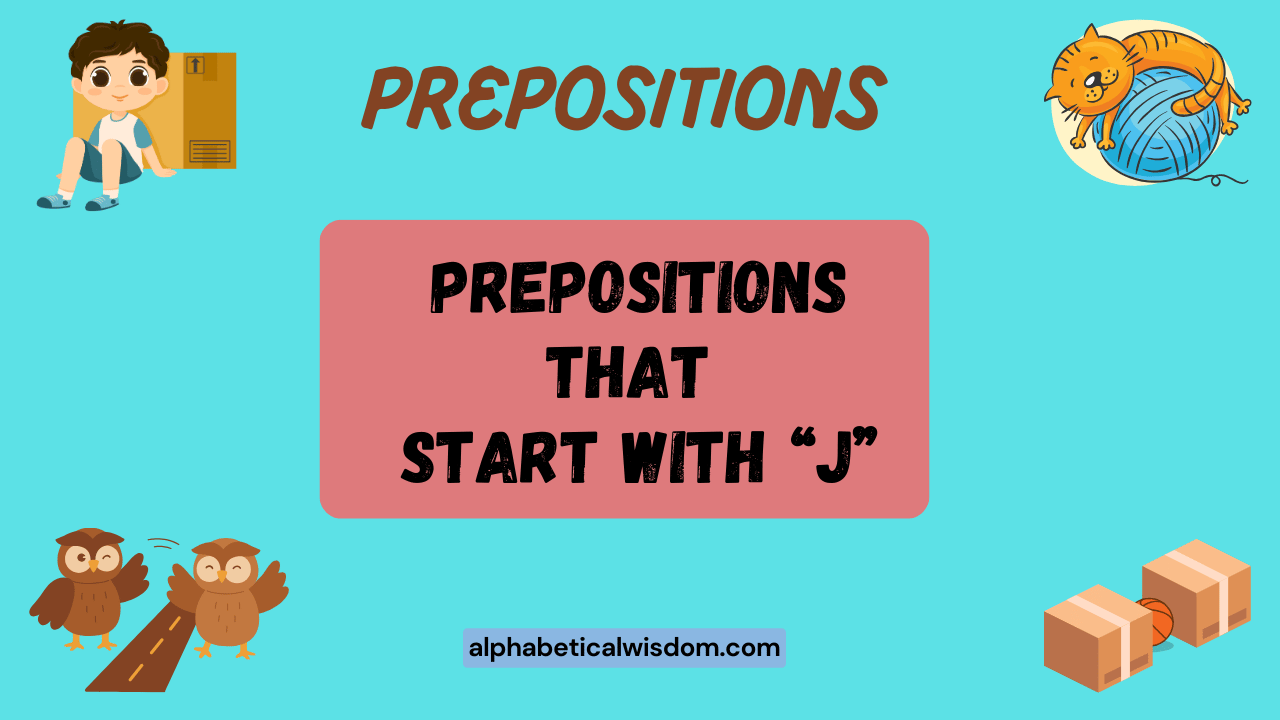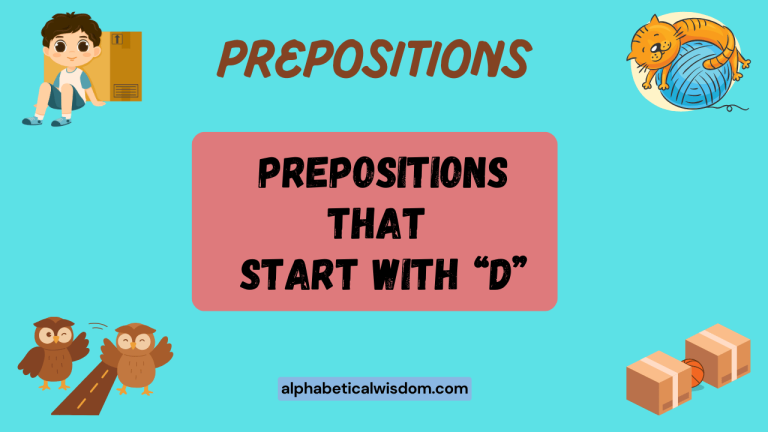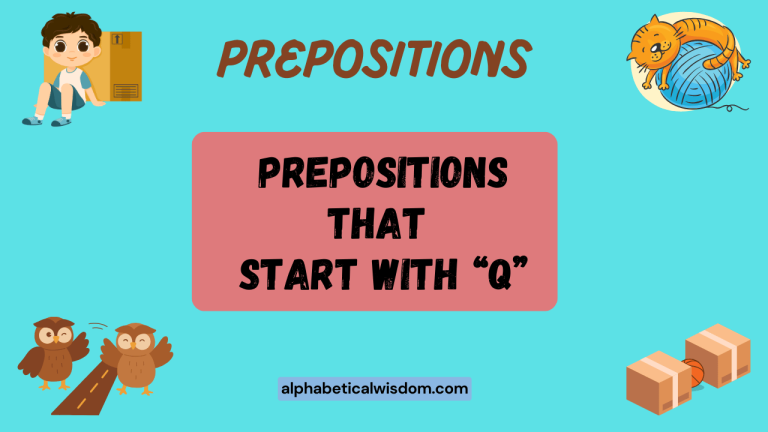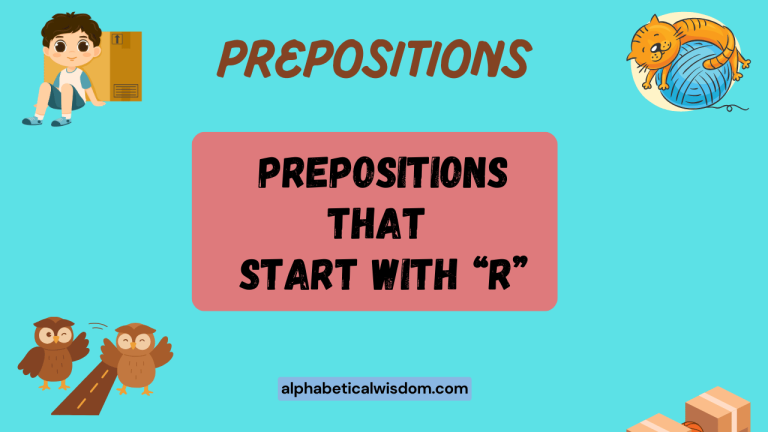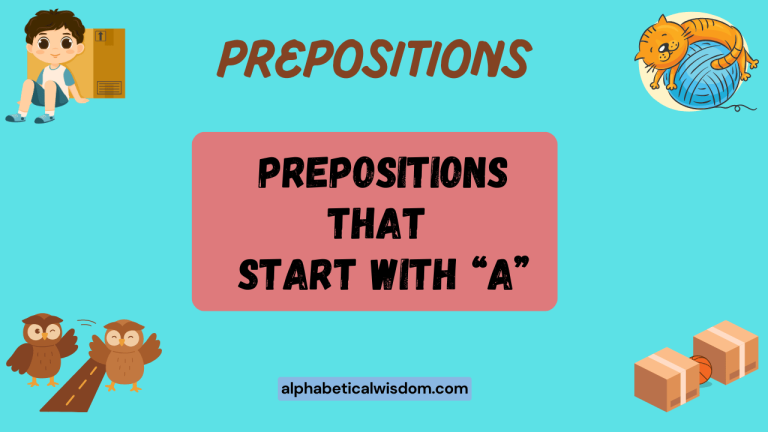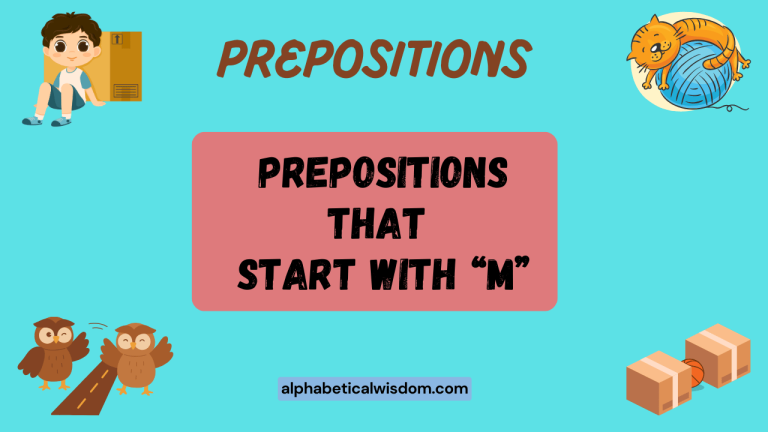Prepositions That Start With J: A Comprehensive Guide
Mastering prepositions is crucial for achieving fluency and accuracy in English. While the English language boasts a wide array of prepositions, this article focuses specifically on those that begin with the letter “J.” Although the list is relatively short, understanding these prepositions and their proper usage is essential for constructing clear, grammatically correct sentences.
This guide is designed for English language learners of all levels, from beginners seeking foundational knowledge to advanced speakers aiming to refine their understanding of nuanced grammar. By exploring definitions, examples, and practice exercises, this article will empower you to confidently incorporate these prepositions into your everyday communication.
Table of Contents
- Introduction
- Definition of Prepositions
- Structural Breakdown of Prepositional Phrases
- Prepositions Starting with J
- Examples of Prepositions Starting with J
- Usage Rules
- Common Mistakes
- Practice Exercises
- Advanced Topics
- FAQ
- Conclusion
Definition of Prepositions
A preposition is a word that connects a noun, pronoun, or noun phrase to other words in a sentence. Prepositions typically indicate spatial, temporal, or logical relationships. They are essential components of English grammar, providing context and clarity to sentence structure. Understanding their function and usage is crucial for effective communication. Prepositions often appear before a noun or pronoun, forming what is known as a prepositional phrase.
Prepositions can be classified based on their meaning or function. Some prepositions indicate location (at, on, in), while others denote time (before, after, during). Still, others express direction (to, from, towards). The versatility of prepositions makes them indispensable in constructing meaningful sentences. Without prepositions, sentences would lack crucial information about the relationships between different elements.
Structural Breakdown of Prepositional Phrases
A prepositional phrase consists of a preposition and its object, which is typically a noun or pronoun. The object of the preposition is the noun or pronoun that the preposition relates to the rest of the sentence. The structure is generally: Preposition + (Optional Modifiers) + Object. For example, in the phrase “in the garden,” “in” is the preposition, and “the garden” is the object of the preposition.
Prepositional phrases can function as adjectives or adverbs within a sentence. When a prepositional phrase modifies a noun or pronoun, it acts as an adjective. For example, “the book on the table” (on the table modifies book). When a prepositional phrase modifies a verb, adjective, or adverb, it acts as an adverb. For example, “he walked to the store” (to the store modifies walked). Understanding the function of prepositional phrases is key to analyzing sentence structure and meaning.
Prepositions Starting with J
The English language has a limited set of prepositions that begin with the letter “J.” The most commonly encountered ones are “just as” and “judging by.” While not as frequently used as other prepositions, mastering their usage is essential for nuanced and sophisticated communication. These prepositions often introduce comparisons or indicate a basis for judgment or inference.
It’s important to note that “just” can also function as an adverb, and its meaning changes based on context. However, when used in the phrase “just as,” it functions as a preposition introducing a comparison.
Similarly, “judging” can be part of a verb phrase, but “judging by” serves as a preposition indicating a basis for an opinion or assessment. Recognizing these distinctions is crucial for accurate interpretation and usage.
Examples of Prepositions Starting with J
This section provides examples of how to use “just as” and “judging by” correctly in sentences. Each preposition will be illustrated with multiple examples to showcase different contexts and nuances.
Just As
The prepositional phrase “just as” is used to draw a comparison between two things or situations, emphasizing their similarity. It often introduces a clause that mirrors another clause in terms of structure or meaning. The phrase can be used to highlight parallel actions, states, or characteristics. When using “just as,” ensure that the elements being compared are logically connected and that the comparison enhances clarity.
The following table provides examples of sentences using “just as” to illustrate various comparative contexts.
| Example | Explanation |
|---|---|
| Just as the sun rises in the east, hope dawns after despair. | Compares a natural phenomenon with an emotional state. |
| Just as a tree needs water to grow, a child needs love to thrive. | Compares the needs of a plant with the needs of a child. |
| Just as an artist uses paint, a writer uses words. | Compares the tools used by different types of creators. |
| Just as a doctor prescribes medicine, a teacher provides knowledge. | Compares the roles of different professionals. |
| Just as a chef follows a recipe, a programmer follows code. | Compares the processes involved in cooking and programming. |
| Just as a climber needs ropes, a student needs books. | Compares essential tools for different activities. |
| Just as a gardener tends to plants, a leader guides people. | Compares nurturing roles in different contexts. |
| Just as a sculptor shapes clay, a coach molds athletes. | Compares the process of shaping physical objects and people. |
| Just as a pilot navigates a plane, a captain steers a ship. | Compares the roles of individuals in transportation. |
| Just as a detective solves a mystery, a scientist conducts research. | Compares problem-solving approaches in different fields. |
| Just as a musician plays an instrument, an orator delivers a speech. | Compares forms of artistic expression. |
| Just as a baker kneads dough, a potter forms clay. | Compares hands-on crafting skills. |
| Just as a tailor sews fabric, a builder constructs buildings. | Compares the creation of different kinds of structures. |
| Just as a librarian organizes books, a curator arranges exhibits. | Compares roles related to organizing information and artifacts. |
| Just as a referee enforces rules, a judge upholds laws. | Compares figures of authority in different systems. |
| Just as a shepherd cares for sheep, a mentor guides mentees. | Compares nurturing and guiding roles. |
| Just as a firefighter extinguishes flames, a mediator resolves conflicts. | Compares roles focused on resolving crises. |
| Just as a composer writes music, a playwright writes plays. | Compares creative writing roles in different art forms. |
| Just as a programmer debugs code, an editor corrects manuscripts. | Compares roles focused on refining and improving creations. |
| Just as a bee collects nectar, a researcher gathers data. | Compares the process of collecting essential resources. |
| Just as a river flows to the sea, life moves towards its end. | Compares a natural process with the journey of life. |
| Just as a compass points north, intuition guides decisions. | Compares a navigational tool with an internal sense of direction. |
| Just as a seed grows into a plant, a small idea can become a big innovation. | Compares the growth of a plant with the development of an idea. |
Judging By
The prepositional phrase “judging by” is used to indicate that a conclusion or opinion is based on specific evidence or observations. It introduces the basis upon which a judgment is formed. This phrase is useful when you want to explicitly state the source of your assessment. When using “judging by,” ensure that the evidence you cite is relevant and credible.
The following table provides examples of sentences using “judging by” to illustrate how conclusions are drawn from different types of evidence.
| Example | Explanation |
|---|---|
| Judging by the dark clouds, it’s going to rain soon. | The judgment is based on visual observation of the weather. |
| Judging by her smile, she’s happy with the results. | The judgment is based on observing someone’s facial expression. |
| Judging by the empty shelves, the store is having a sale. | The judgment is based on the state of the store’s inventory. |
| Judging by the heavy traffic, there must be an accident. | The judgment is based on traffic conditions. |
| Judging by his performance, he’s likely to get promoted. | The judgment is based on someone’s work output. |
| Judging by the high prices, this restaurant is expensive. | The judgment is based on the pricing of the menu items. |
| Judging by the long lines, the event is popular. | The judgment is based on the crowd size. |
| Judging by the positive reviews, the movie is worth watching. | The judgment is based on external opinions and feedback. |
| Judging by the number of applicants, the job is highly sought after. | The judgment is based on the level of competition. |
| Judging by the speed of the response, they were waiting for our call. | The judgment is based on the timing of an action. |
| Judging by the complexity of the problem, it will take time to solve. | The judgment is based on the nature of the problem. |
| Judging by the quality of the materials, the product is durable. | The judgment is based on the physical characteristics of the product. |
| Judging by the lack of complaints, customers are satisfied. | The judgment is based on the absence of negative feedback. |
| Judging by the enthusiasm of the team, they are confident about winning. | The judgment is based on the team’s morale and attitude. |
| Judging by the advanced technology, the company is innovative. | The judgment is based on the level of technological advancement. |
| Judging by the historical evidence, the theory is plausible. | The judgment is based on documented facts and records. |
| Judging by the economic indicators, the country is recovering. | The judgment is based on economic data and statistics. |
| Judging by the scientific research, the hypothesis is supported. | The judgment is based on empirical findings and studies. |
| Judging by the statistical analysis, the results are significant. | The judgment is based on quantitative data analysis. |
| Judging by the artistic style, the painting is from the Renaissance period. | The judgment is based on the characteristics of the art. |
| Judging by the symptoms, the patient might have a cold. | The judgment is based on observed medical signs. |
| Judging by the architectural design, the building is quite old. | The judgment is based on the structure’s design features. |
| Judging by the taste, this dish has a lot of spices. | The judgment is based on sensory perception. |
Usage Rules
When using prepositions starting with “J,” it’s important to adhere to specific grammatical rules to ensure clarity and accuracy. For “just as,” ensure that the elements being compared are parallel in structure and meaning. The clause following “just as” should mirror the structure of the main clause. For “judging by,” make sure that the evidence you cite is relevant and logically supports the conclusion you are drawing. Avoid making sweeping generalizations based on insufficient evidence.
Consider the following guidelines for each preposition:
- Just As: Use to introduce a comparison, ensuring the compared elements are logically connected and structurally similar. The clause introduced by “just as” should mirror the main clause in terms of grammatical structure.
- Judging By: Use to indicate the basis for a judgment or conclusion. Ensure that the evidence cited is relevant, credible, and sufficient to support the judgment being made.
Common Mistakes
One common mistake is using “just as” without ensuring parallel structure in the clauses being compared. For example, the sentence “Just as he is tall, his sister has intelligence” is incorrect because it compares a physical attribute (height) with an intellectual attribute (intelligence) without a clear parallel. A correct version would be “Just as he is tall, his sister is intelligent.” Another frequent error is using “judging by” to draw conclusions based on insufficient or irrelevant evidence. For instance, saying “Judging by the color of the car, he must be rich” is a flawed judgment as car color is not a reliable indicator of wealth.
Here’s a table illustrating common mistakes and their corrections:
| Incorrect | Correct | Explanation |
|---|---|---|
| Just as he likes to read, she enjoys to write. | Just as he likes to read, she enjoys writing. | Parallel structure requires both verbs to be in the same form (gerund). |
| Judging by the weather, it is a good person. | Judging by the weather, it will be a good day. | The evidence must be related to the conclusion. |
| Just as the bird fly, the plane soars. | Just as the bird flies, the plane soars. | Verb tenses must agree in the parallel clauses. |
| Judging by the price, it must been good. | Judging by the price, it must be good. | Correct verb tense and auxiliary verb usage. |
| Just as he studies hard, she is intelligent. | Just as he studies hard, she works diligently. | Parallel actions should be compared, not unrelated attributes. |
Practice Exercises
Test your understanding of prepositions starting with “J” with these exercises. These exercises will help you reinforce the concepts covered in this article.
Exercise 1: Fill in the Blanks
Complete the following sentences using either “just as” or “judging by.”
| Question | Answer |
|---|---|
| 1. ______ the clouds, it looks like it’s going to rain. | Judging by |
| 2. ______ a plant needs sunlight, a student needs knowledge. | Just as |
| 3. ______ her smile, she seems very happy. | Judging by |
| 4. ______ a painter uses brushes, a musician uses instruments. | Just as |
| 5. ______ the traffic, we’re going to be late. | Judging by |
| 6. ______ a seed grows into a tree, a small idea can become a great invention. | Just as |
| 7. ______ his grades, he’s a very good student. | Judging by |
| 8. ______ an author writes books, a composer writes music. | Just as |
| 9. ______ the news reports, the situation is getting worse. | Judging by |
| 10. ______ a doctor treats patients, a teacher educates students. | Just as |
Exercise 2: Error Correction
Identify and correct the errors in the following sentences.
| Question | Answer | Corrected Answer |
|---|---|---|
| 1. Judging of the weather, it will be sunny. | Judging of the weather, it will be sunny. | Judging by the weather, it will be sunny. |
| 2. Just as he runs fast, she likes to read. | Just as he runs fast, she likes to read. | Just as he runs fast, she reads quickly. |
| 3. Judging for his clothes, he is rich. | Judging for his clothes, he is rich. | Judging by his clothes, he is rich. |
| 4. Just as she is kind, he has generosity. | Just as she is kind, he has generosity. | Just as she is kind, he is generous. |
| 5. Judging with the data, the results are accurate. | Judging with the data, the results are accurate. | Judging by the data, the results are accurate. |
| 6. Just as he sings good, she plays well. | Just as he sings good, she plays well. | Just as he sings well, she plays well. |
| 7. Judging from her face, she is sadness. | Judging from her face, she is sadness. | Judging by her face, she is sad. |
| 8. Just as the plant grow, the child develops. | Just as the plant grow, the child develops. | Just as the plant grows, the child develops. |
| 9. Judging about the situation, it’s serious. | Judging about the situation, it’s serious. | Judging by the situation, it’s serious. |
| 10. Just as he is smart, she has intelligence. | Just as he is smart, she has intelligence. | Just as he is smart, she is intelligent. |
Advanced Topics
For advanced learners, exploring the nuances of comparative structures and the subtleties of drawing inferences can further enhance their understanding of these prepositions. Consider researching different types of comparisons and the logical fallacies that can arise when making judgments based on limited evidence.
Analyzing complex texts and identifying the implicit assumptions underlying statements using “judging by” can also be a valuable exercise. Furthermore, explore the historical evolution of these prepositions and their usage in different literary styles to gain a deeper appreciation for their linguistic richness.
Advanced learners can also delve into the philosophical implications of using “judging by,” particularly in the context of epistemology and the theory of knowledge. Exploring how different cultures and languages express similar concepts can provide a broader perspective on the role of prepositions in shaping thought and communication.
FAQ
Here are some frequently asked questions about prepositions starting with “J”:
- Are there any other prepositions that start with “J” besides “just as” and “judging by”?
While “just as” and “judging by” are the most commonly recognized prepositions starting with “J,” it’s important to note that the classification of certain phrases as prepositions can be debated. Some less common phrases might be considered prepositional in specific contexts, but they are not widely recognized as standard prepositions. - Can “just as” be used interchangeably with “like”?
While “like” can be used for comparisons, “just as” is generally considered more formal and grammatically precise, especially in written English. “Just as” is typically followed by a clause (subject + verb), whereas “like” is often followed by a noun or pronoun. - Is it always necessary to have a complete clause after “just as”?
Yes, “just as” typically introduces a complete clause to ensure a clear and parallel comparison with the main clause. This helps maintain grammatical correctness and clarity. - Can “judging by” be used at the end of a sentence?
No, “judging by” is a prepositional phrase that typically introduces the basis for a judgment and should be placed at the beginning of a sentence or clause. - What is the difference between “judging by” and “based on”?
“Judging by” implies an inference or opinion based on evidence, while “based on” simply indicates a foundation or source of information. “Judging by” is more subjective and implies a personal assessment. - How can I improve my understanding of prepositions in general?
Reading extensively, paying attention to how native speakers use prepositions, and practicing with exercises are all effective ways to improve your understanding. Consulting grammar resources and seeking feedback from teachers or language partners can also be helpful. - Are there any regional variations in the usage of these prepositions?
While the core meaning and usage of “just as” and “judging by” are generally consistent across different regions, subtle variations in frequency and stylistic preference may exist. Pay attention to the specific context and audience when using these prepositions. - What are some common synonyms for “judging by”?
Synonyms for “judging by” include “based on,” “according to,” “from what I can see,” and “on the basis of.” The best synonym to use will depend on the specific context and the nuance you want to convey. - Is it correct to say “just like” instead of “just as”?
While “just like” is commonly used in informal speech, “just as” is generally preferred in formal writing and when a complete clause follows the comparison. “Just like” is often followed by a noun phrase.
Conclusion
Mastering prepositions, including those starting with the letter “J,” is crucial for effective communication in English. While the list may be short, understanding the proper usage of “just as” and “judging by” can significantly enhance the clarity and sophistication of your language skills.
By grasping the nuances of these prepositions, you can construct more precise and meaningful sentences, improving both your written and spoken English.
Remember to focus on understanding the context in which these prepositions are used and to practice regularly to reinforce your knowledge. Pay attention to the parallel structure required when using “just as” and ensure that your judgments based on “judging by” are supported by relevant evidence.
With consistent effort and attention to detail, you can confidently incorporate these prepositions into your everyday communication and achieve greater fluency in English.
